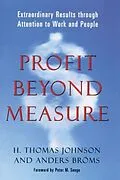Waste has plagued almost every industrial-age firm for the past century. In this powerfully argued alternative to conventional cost management thinking, experts H. Thomas Johnson and Anders Bröms assert that any company can avoid the waste that is generated through excessive operating costs in the short run and excessive losses from market instability in the long run. To gain more secure levels of profitability, management must simply change how it thinks about work and how it organizes work.
Profit Beyond Measure details how two extremely profitable manufacturers, Toyota and the Swedish truck maker Scania, have rejected the traditional mechanistic mindset of managing by results that generates waste. Johnson and Bröms explain how Toyota and Scania achieve their legendary cost advantage through a revolutionary concept they call managing by means (MBM). Instead of being driven to meet preconceived accounting targets, the production systems of Toyota and Scania are governed by the three precepts that guide all living systems: self-organization, interdependence, and diversity.
Amid a wealth of new insights into Toyota's vaunted system, Johnson and Bröms introduce the tools of MBM to show how design, production, and profitability analysis are done to customer order. They demonstrate that by following the principles that emulate life systems, even a lean and profitable company can organize work to greatly lessen its long-term earnings instability and sharply reduce its short-run operating costs.
Scania has achieved sixty-five years of financial stability and longevity in the face of fierce competition. Toyota has amassed a market value since 1988 that has rivaled -- or sometimes surpassed -- the American "Big Three" automakers combined. The principles that Johnson and Bröms set forth in Profit Beyond Measure can guarantee the same richer, longer life to any company that applies them.
Autorentext
H. Thomas Johnson is Professor of Business Administration at Portland State University in Oregon and Distinguished Consulting Professor of Sustainable Business at Bainbridge Graduate Institute in Washington. He co-authored Relevance Lost: The Rise and Fall of Management Accounting, which is considered one of the most influential management books of the twentieth century by the Harvard Business Review.
Inhalt
Two ways of perceiving Henry Ford's original vision for low-cost mass production prompt different companies after 1950 to adopt very different ways of organizing work. These perceptions of work, reflecting distinctly different systems of thought, are referred to as "managing by results" (MBR) and "managing by means" (MBM).
A brief history of management by results from the 1950s to the 1990s; how businesses use
financial abstractions to amplify their grasp of the world by losing touch with it; how practices based on MBR thinking inevitably destroy the businesses that use them.
How Toyota Motor Manufacturing in Georgetown, Kentucky, the American operation of one of the world's most profitable auto makers, succeeds by managing production activities from a life-systems perspective, not managing by results.
How Scania, a highly profitable maker of heavy trucks, succeeds by embracing a natural "spirit in the walls"; managing product design from the perspective of nature's system of evolution, not managing by results.
How order-line maps and ratios may be fundamental tools for managing by means, in the same way that measurement and management accounting are fundamental tools for managing by results; how companies use order-line profitability analysis to assess their efforts at reducing structural complication in design, operations, and administration.
How any organization can learn to master the principles that guide living systems in nature; steps managers can follow to stop chasing quantitative targets and, instead, to manage by means.
MBM practices not only improve the long-run financial performance of businesses, they also improve humankind's situation in the ecosystem that sustains all life on Earth.
